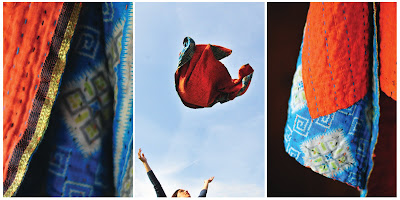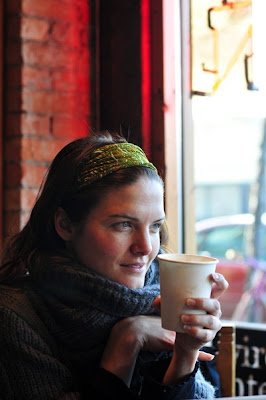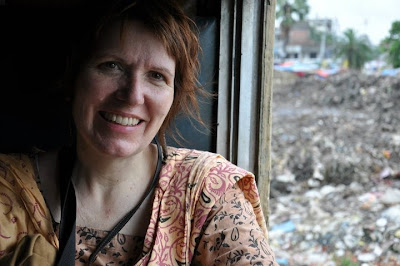by Rachel Johnson
Like Kristen Hoffman and Kate Kruuse, our fearless friends at Swakx who were featured in last month’s WM Spotlight, Sarah Aulie and Robin Seyfert make an incredible team. They work together at Hand & Cloth, a non-profit organization that enables women in Bangladesh to gain job skills and enter into the work force, empowering them to become leaders in their communities. Sarah and Robin are incredible young women who credit their motivation and success to the beautiful women that they serve in Bangladesh. Read on to learn more about their cause
Q: Sarah and Robin, thank you for being part of our Spotlight Series. Last month we featured a dynamic duo working together to combine their creativity and make the world a better place. You two do just the same thing, only in a different country and with a different product. Tell us about Hand & Cloth.
Sarah: Each day at Hand & Cloth in Bangladesh, women gather together in the workplace to sew beautiful kantha blankets handmade from vintage sari cloth. It’s a beautiful sight to see women who were once at high-risk of exploitation now working together in dignity and hope. It’s an even more beautiful sight to be an eyewitness as women hear the Word of God in the work place.
While a job gives a woman dignity, real hope comes when women hear the good news and learn that they are loved by God and created for a good purpose.
These two things are important to us – work and Word. Works brings a livelihood to a woman who would otherwise have to live on the street. The Word of God brings Life – true, everlasting and abundant Life! – to a woman who otherwise would not have known that she is loved and made for a good purpose.
Q: I love that you cite the Hebrew term “rapha” (referring to healing) in your vision statement. Tell us the detailed meaning of this word and how it came to be such a significant component of your mission statement.
Sarah: My first trip to Bangladesh was back in 2007. During that time I was doing a Beth Moore study called Believing God (I recommend that study to everyone!). One of the words in the study was the Hebrew word “Rapha.” Rapha means “to stitch,” “to mend” or “to heal.”
As we were writing our vision statement, we continued to find countless stories in the New Testament of women who approached God and found healing – think about the woman who was bleeding for 12 years, for example (Matthew 9:20-22). She believed that if she could touch even the edge of His cloak, she would be healed. She approached Him in the midst of a crowd of people, she reached out her hand to touch Him, and she was healed. This is our hope for each woman at Hand & Cloth – that she would come to know God as “Rapha,” the one who heals.
Q: How did you choose Bangladesh as the home of your social enterprise?
Sarah: God brought both Robin and I on different journeys to Bangladesh. I can look back and see His sovereign plan in crossing our paths. I went to Bangladesh in 2007 to volunteer at an organization started by a woman who I greatly respected, Faith Willard. I was studying Bengali and planning on one day returning to Kolkata, India. Little did I know that God had long-term plans for me in Bangladesh!
During my time in Bangladesh, I started making trips up to Mymensingh, a town three hours north of the capitol city. My Bengali friend and interpreter had introduced me to Rajani* (pseudonym used), who lived in Mymensingh. Rajani had been forced into prostitution as the only means of feeding her children. We continued to make trips to Mymensingh, visiting Rajani. I remember one particular visit when we shared with her the story of a foot washing in Scripture. Rajani couldn’t believe that anyone would wash people’s feet!
Robin: I went to Bangladesh initially in 2006 with Mennonite Central Committee (MCC) to developing HIV Awareness programs. A colleague pointed to the huge need to provide alternative opportunities to women in prostitution. We started a yearlong training program following which the women were employed by MCC enterprises. The first year we took 26 women expecting up to half to drop out. All 26 completed the program.
Sarah: I visited the training program just a year later and could hardly recognize Rajani. Was this the same woman who once could hardly look at me in the eyes? Now she wore a clean sari and held her head straight!
Robin: In 2010, when my contract with MCC was coming to an end, the Hand & Cloth Board asked if I would consider moving to Kolkata, India, to run one of the organization’s programs there. I actually expected to say yes. But one day I was standing by the rail station where so many of the women, including Rajani, had been working and living. In the midst of the squalor I saw several of our trainees approaching. They called out to me and showed me the books they were taking home to practice their new literacy skills. The contrast of the hope on their bright faces with the sadness and depravity made me realize I could not leave when so many lives could be changed so completely.
Recognizing that sustainable work was essential to help these women become all they could be, I began to make plans to start a business in Bangladesh. When Hand & Cloth agreed to come behind this business, it was obviously God bringing us together into a work he had prepared in advance for us to do.
Q: Fill us in on the Kantha Tradition: what is it, and how does it apply to Hand & Cloth’s vision?
Sarah: For centuries, thrifty Bengali women have reused their saris, binding them together with a simple running stitch called the “kantha” stitch. These blankets keep their children warm during the colder months. The choices of the cloth and thread color, along with the elaborate stitches that are added, have turned this function into an art form in Bangladesh. At Hand & Cloth, we are delighted to see how the women take extra time with their blankets so that each one is truly transformed into a work of art.
Stay tuned for part two tomorrow!




